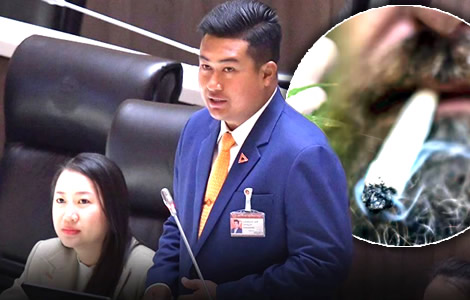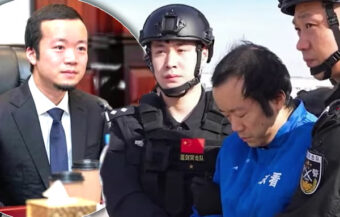People’s Party MP warns Phuket’s lax cannabis rules and smoke are driving away high-spending tourists, hurting the vital economy. He calls for urgent government crackdown, tighter regulations, and zoning before the island’s reputation and tourism industry suffer irreversible damage from stinking reefers.
A People’s Party MP blasted the government Thursday for letting public cannabis use run wild on the island. He warned the heavy smoke and stench are chasing away high-value tourists, threatening to wreck Phuket’s vital tourism economy. His sharp critique echoes former PM Thaksin Shinawatra’s recent shot across the bow, warning cannabis legalisation is scaring off conservative travellers. Chalermpong Saengdee called for an immediate, ruthless crackdown to crush public marijuana use before it’s too late to save the local tourist industry.

A senior lawmaker from the People’s Party has sounded the alarm over growing marijuana-related problems in Phuket. He warned that the smell of cannabis is now driving away “quality tourists” and damaging the island’s global reputation.
Mr. Chalermpong Saengdee, a Member of Parliament representing Phuket, issued a detailed statement in Parliament on Thursday. He demanded urgent government action to regulate cannabis use and reorganise how marijuana shops operate across the province.
“Picture this,” Chalermpong said. “A family walking on the beach at sunset. The sea breeze is perfect. The moment is peaceful. But suddenly, they smell cannabis in the air. It ruins the experience. There’s no way to avoid it.”
Cannabis smell is ruining tourist experiences and demands immediate government intervention in Phuket
According to him, this scene is no longer rare. In fact, it has become the norm in parts of Phuket. He attributed the problem to the lack of serious government control since marijuana was decriminalised in 2022.
Since then, cannabis has become widely accessible with few limits on where or how it is used. As a result, shops have multiplied quickly, particularly in tourist-heavy zones. But, Chalermpong noted, no legal framework has been fully enforced.
“This started with the last government,” he said. “But the current one has also failed to act. We are still without clear laws.”
Furthermore, he emphasised that allowing cannabis sales is not the issue in itself. The problem, he said, is the lack of regulation. He called for a system similar to that used for alcohol — including age limits, time restrictions, and zoning regulations.
“Right now, you walk around and all you see are weed shops,” Chalermpong said. “That’s not balance. That’s chaos.”
For example, alcohol sales are legally controlled. You can’t buy it anytime or anywhere. Therefore, similar laws should apply to marijuana. He stressed that zoning would keep cannabis shops away from family areas and beaches.
Lack of clear laws and regulation has led to chaos with cannabis shops proliferating across Phuket
In addition, Chalermpong pointed out that the smell itself is becoming a top complaint from tourists. “This isn’t just an opinion,” he said. “It’s in reviews, online posts, and word-of-mouth. People are talking about it.”
Importantly, he said this trend is pushing away high-value visitors. “We call them ‘quality tourists’ — people who stay longer, spend more and come back,” he explained. “But they are leaving.”
He warned that this shift could seriously hurt Phuket’s economy in the long term. After all, tourism is the province’s economic backbone. Without repeat visitors, local businesses struggle. Moreover, he said, replacing those tourists with short-term or lower-spending ones won’t make up the difference.
Consequently, Chalermpong urged the government to weigh the tradeoffs. “We may gain a small group of cannabis tourists,” he said. “But we’re losing a larger, more valuable group. Is it worth it?”
Cannabis odour complaints are driving away high-value tourists who sustain Phuket’s economy
He noted that families, retirees, and honeymooners are particularly turned off by the environment. “They come for peace, not pot,” he said. “But they can’t enjoy the beach anymore.”
Meanwhile, cannabis shops continue opening across Phuket. Many operate late into the night, often with loud music and little oversight. Even school zones and religious sites have shops nearby.
Additionally, Chalermpong expressed concern over the impact on Phuket’s image as a premium travel destination. “We used to be known for our beaches, culture and hospitality,” he said. “Now we’re becoming known for something else entirely.”
Beyond this, Chalermpong criticised the government’s visa-free policy. He claimed it had worsened the problem by allowing more so-called “grey tourists” into Thailand. These are visitors who enter legally but engage in illegal or borderline activity.
“When the visa-free policy started, we hoped to attract more Chinese tourists,” he said. “But the ones we wanted didn’t come.”
Families avoid Phuket as cannabis shops multiply and visa-free policy brings problematic tourists
Instead, Chalermpong said, the country attracted people who exploited the easy entry rules. Many stayed longer than permitted. Some started unlicensed businesses. Others entered the labour market illegally.
Therefore, he urged the government to re-evaluate its visa strategies. “Good policies need to be based on outcomes, not assumptions,” he said. “And this one clearly had unintended consequences.”
He noted that the arrival of grey tourists has led to new social and legal problems in tourist cities. “In some cases, these visitors are involved in scams or underground businesses,” Chalermpong said.
As a result, he asked the government to screen tourists more carefully and monitor visa overstays. “We need tourists who respect our laws, not bypass them,” he added.
Visa policy failures have led to grey tourists, causing new social and legal problems in tourist cities
He also reminded Parliament that visa policy alone cannot restore Phuket’s tourism. “It’s about the whole picture,” he said. “Visa rules, public space management, law enforcement and image — they all matter.”
More importantly, he said that Phuket is at a tipping point. Without change, it may lose its global appeal. “We are a world-class city,” Chalermpong said. “But even the best destinations can fall.”
He urged officials to use the remaining time in their term to take real action. “We can’t just talk,” he warned. “We must restore confidence now.”
Notably, many business owners in Phuket share his concerns. Hotel managers have reported a drop in high-spending guests. Tour operators say families are choosing other locations. Some worry that 2025 could be worse than the post-COVID recovery years.
Meanwhile, online reviews continue to mention marijuana. On travel forums, the smell is listed among common complaints. “I came for beaches, not weed,” wrote one recent tourist. “The smell was everywhere.”
Phuket faces a tipping point as businesses report fewer quality tourists. Online reviews cite cannabis smell
Therefore, Chalermpong asked for urgent new laws and zoning to reduce exposure to cannabis smoke. “If we act now, we can still turn this around,” he said. “But every month we delay, more tourists choose elsewhere.”
He concluded his address with a direct appeal. “Let’s bring back the Phuket we’re proud of. One that’s clean, safe and world-famous for the right reasons.”
As of now, the government has already introduced new cannabis regulations. They are to come into effect in mid-November. In short, cannabis can only be bought with a medical certificate.
However, debate continues with the Minister of Public Health on record wanting to relist it as a scheduled narcotic. This certainly could happen in advance of the new November regime.
Urgent cannabis regulations could still reverse tourist decline as the government acts mid November
After that, cannabis would revert to being illegal except when issued with a prescription. However, even under the law presently, smoking in public is subject to control.
Nevertheless, the problem is that it’s controlled by secondary legislation, which treats cannabis as a herb. Basically, the Royal Thai Police have shown a reluctance to tightly police the substance, given the weakness of the present legal regime.
Thaksin blames charter for indecisive governance and cannabis for a fall in Thailand’s tourism appeal
Until then, the issue remains unresolved. Residents, businesses and tourists continue to deal with the consequences daily. Without decisive action, Chalermpong warned, Phuket’s image may decline beyond repair. “Let’s not wait for that moment,” he said. “Let’s act — before it’s too late.”
Join the Thai News forum, follow Thai Examiner on Facebook here
Receive all our stories as they come out on Telegram here
Follow Thai Examiner here
Further reading:
Senate Committee Chair tells government to send Trump’s men packing and accept the 36% tariff rate


















